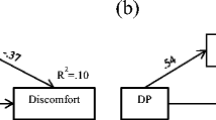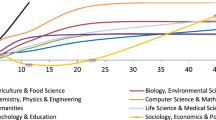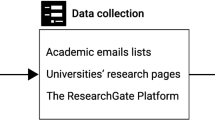Abstract
The phenomenon of cheating in higher education is of overwhelming importance in that the students engaging in these acts are unlikely to have the skills necessary for their future professional life. Despite its relevance, the empirical evaluation of cheating in universities has been almost exclusively focused on the US context. Little is known about cheating at the European level, let alone in Portugal. Even less is explored at the regional level. In this paper we present evidence on the perception of cheating by Portuguese undergraduate students of economics/business degrees. We undertake a large-scale survey, involving 2675 students from all Portuguese mainland public universities (10). We found that copying-favourable environments are associated with a higher propensity to cheat. Moreover, in universities where ‘codes of honour’ exist, this propensity tends to be lower. Finally, the propensity to copy seems to be highly influenced by the cultural systems and socially-related factors of different regions.



Similar content being viewed by others
Notes
Rocha and Teixeira (2005) provide a detailed description of the different methods, presenting their relative strengths and weaknesses.
There is another category, ‘Others’, which includes broadly speaking students from the Portuguese-speaking Countries, Erasmus students, Armed Forces, etc., who represent 1.1% of the students surveyed.
The average ‘response rate’ (total students surveyed over total students enrolled) was 37.5%, ranging from a minimum of 17.3% to a maximum of 52.0%. It is important to stress that this ‘response rate’ is underestimated as we consider students enrolled in classes that had the highest number of enrolments in a given year; thus, it is highly likely that these classes have students from several schooling years due to retentions.
The Autonomous Region of the Azores (not represented in the graph) is included in the group of NUTs with students with a lower propensity to copy (50%).
The logistic regression model is also preferred to another conventional estimation technique, discriminant analysis. According to Hosmer and Lemeshow (1989), even when assumptions required for discriminant analysis are satisfied, logistic regression still performs well.
The odds of an event occurring are defined as the ratio of the probability that it will occur to the probability that it will not.
This test null hypothesis denotes that the values predicted by the model are not significantly different from the observed values. Given that the p-value is not significant for standard values, this hypothesis is not rejected, leading us to the conclusion that both models foresee reality reasonably well.
Ratio of the probability of copying to the probability of not copying.
References
Barro, R. J., & Lee, J. W. (2000). International data on educational attainment updates and implications. NBER Working Paper nº 7911, National Bureau of Economic Research.
Becker, G. S. (1968). Crime and punishment: an economic approach. Journal of Political Economy, 76, 168–217.
Bernardi, R. A., Metzger, R. L., Bruno, R. G. S., Hoogkamp, M. A. W., Reyes, L. E., & Barnaby, G. H. (2004). Examining the decision process of students’ cheating behaviour: an empirical Study. Journal of Business Ethics, 50, 397–414.
Bunn, D. N., Caudill, S. B., & Gropper, D. M. (1992). Crime in the classroom: an economic analysis of undergraduate student cheating behavior. Journal of Economic Education, 23, 197–207.
Dick, M., Sheard, J., Bareiss, C., Carter, J., Joyce, D., Harding, T., et al. (2003). Addressing student cheating: definitions and solutions. ACD SIGCSE Bulletin, 35(2), 172–184.
Diekhoff, G. M., LaBeff, E. E., Shinohara, K., & Yasukawa, H. (1999). College cheating in Japan and the United States. Research in Higher Education, 40(3), 343–353.
Ehrlich, I. (1973). Participation in illegitimate activities: a Theoretical and empirical investigation. Journal of Political Economy, 81, 521–65.
Garoupa, N. (2001). Optimal law enforcement when victims are rational players. Economics of Governance, 2, 231–242.
Greene, W. H. (2003). Econometric analysis. Prentice Hall.
Hanushek, E., & Kimbo, D. (2000). Schooling, labor-force quality and growth of nations. The American Economic Review, 90(5), 1184–208.
Horvath, R., & Kolomaznikova, E. (2002). Individual decision-making to commit a crime: early models. Law and Economics, 0210001, 1–17.
Hosmer, D., & Lemeshow, S. (1989). Applied logistic regression. New York: Wiley.
Hrabak, M., Vujaklija, A., Vodopivec, I., Hren, D., Marusic, M., & Marusic, A. (2004). Academic misconduct among medical students in a postcommunist country. Medical Education, 38(3), 276–285.
Kerkvliet, J. (1994). Cheating by economics students: a comparison of survey results. Journal of Economic Education, 25(2), 121–133.
Kerkvliet, J., & Sigmun, C. L. (1999). Can we control cheating in the classroom? Journal of Economic Education, 30(4), 331–351.
Magnus, J. R., Polterovich, V. M., Danilov, D. L., & Savvateev, A. V. (2002). Tolerance of cheating: an analysis across countries. Journal of Economic Education, 33, 125–135.
McCabe, D. L., & Trevino, L. K. (1997). Individual and contextual influences on academic dishonesty: a multicampus investigation. Research in Higher Education, 38(3), 379–396.
McCabe, D. L., Butterfield, K. D., & Trevino, L. K. (2003). Faculty and academic integrity: the influence of current honor codes and past honor code experiences. Research in Higher Education, 44(3), 367–385.
Nowell, C., & Laufer, D. (1997). Undergraduate student cheating in the fields of business and economics. Journal of Economic Education, 28, 3–12.
Pulvers, K., & Diekhoff, G. M. (1999). The relationship between academic dishonesty and college classroom environment. Research in Higher Education, 40(4), 487–498.
Rettinger, D. A., Jordan, A. E., & Peschiera, F. (2004). Evaluating the motivation of other students to cheat: a vignette experiment. Research in Higher Education, 45(8), 873–890.
Rocha, M. F. & Teixeira, A. C. (2005). Crime without punishment: an update review of the determinants of cheating among university students. FEP Working Papers nº 191, Faculdade de Economia, Universidade do Porto.
Sheard, J., & Dick, M. (2003). Influences on cheating practice of graduate students in IT courses: what are the factors? ACM SIGCSE Bulletin, 35(3), 45–49.
Teixeira, A. C. C. (2005). Estimating human capital stock in Portugal. An update until 2001. Portuguese Journal of Social Science, 4(2), 101–120.
Tibbets, S. G. (1999). Differences between women and men regarding decisions to commit test cheating. Research in Higher Education, 40(3), 323–342.
Whitey, B. E., Jr. (1998). Factors associated with cheating among college students: a review. Research in Higher Education, 39(3), 235–274.
Wolpin, K. I. (1978). An economic analysis of crime and punishment in England and Wales, 1894–1967. Journal of Political Economy, 86(5), 815–40.
Acknowledgments
We are deeply indebt to all students that responded the survey and to the following individuals (in alphabetic order) for permitting and/or implementing the questionnaire underlying this study.
Directors: Antonieta Cunha Sá (UNL/University Nova of Lisboa), Artur Cristóvão (UTAD/University of Alto Douro e Tràs-os-Montes), Fernando Almeida (Economics and Management School/University of Minho), Joaquim Borges Gouveia (Economics, Business and Industrial Engineering Department/University of Aveiro), José Pereirinha (ISEG/University of Lisbon), José Silva Costa (FEP/University of Porto), Manuel Branco (Faculty of Economics/University of Évora), Paulo Rodrigues (Faculty of Economics/University of Algarve), Pedro Botelho (FEUC/University of Coimbra).
Department Coordinators: Carlos Arriaga (Economics Department/University of Minho), Fernanda Nogueira (Bussiness Department/University of UTAD), José Caldas (Economics Department/University of UTAD).
Professors/Researchers: Ana Maria Rodrigues (University of Coimbra), António Caleiro (University of Évora), Arménio Rego (University of Aveiro), Aurora Galego (University of Évora), Carla Amado (University of Algarve), Carlos Ferreira (University of Aveiro), Carlota Quintal (University of Coimbra), Efigénio Rebelo (University of Algarve), Elisabete Félix (University of Évora), Fernando Cardoso (University of Algarve), Francisco Torres (University of Aveiro), Henrique Albergaria (University of Coimbra), Joana Costa (University of Beira Interior), João Paulo Costa (University of Coimbra), José Belbute (University of Évora), José Novais (University of Évora), Margarida Saraiva (University of Évora), Maria Graça Baptista (University of Açores), Maria João Alves (University of Coimbra), Maria João Carneiro (University of Aveiro), Maria João Thompson (University of Minho), Miguel Lebre de Freitas (University of Aveiro), Óscar Afonso (FEP/University of Porto), Patrícia Valle (University of Algarve).
Other university staff: Ana Paula Teixeira and Cristina Santana (University of Algarve), Sónia Fidalgo (University of Aveiro) and Leonor Dias (University of Coimbra)
A final word of appreciation to Luzia Belchior (FEP—Administrative Office) for her valuable assistance with the optical reading of the survey questionnaires.
Author information
Authors and Affiliations
Corresponding author
Rights and permissions
About this article
Cite this article
Teixeira, A.A.C., de Fátima Oliveira Rocha, M. Academic Misconduct in Portugal: Results from a Large Scale Survey to University Economics/Business Students. J Acad Ethics 8, 21–41 (2010). https://doi.org/10.1007/s10805-010-9102-3
Published:
Issue Date:
DOI: https://doi.org/10.1007/s10805-010-9102-3




